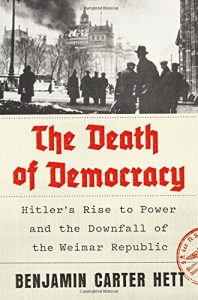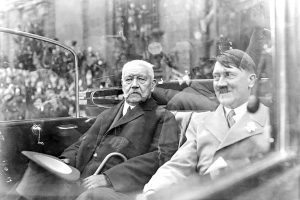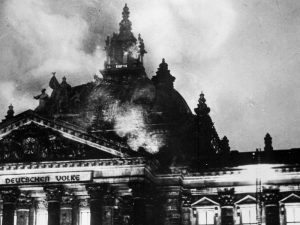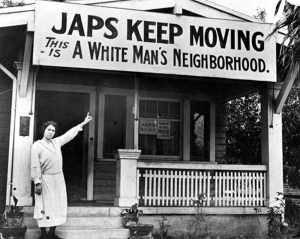“This is the United States of America. It isn’t Nazi Germany.”
– Sen. Dianne Feinstein (D-CA), in an interview on MSNBC, about the Trump administration’s policy of separating migrant children from their parents at the border.
—————
The venerable Senator Feinstein is correct; we are not Nazi Germany – at least not yet.
But we are beginning, in some remarkably troubling ways, to resemble the ill-fated Weimar Republic that preceded Adolf Hitler’s rise to power in 1933. A chilling new book – The Death of Democracy – tells the story of how a cultured, sophisticated people – Weimar Germany was the land of Richard Strauss and Bertolt Brecht, the home to Nobel Prize winners – tumbled into deep political division and then widespread street violence and then a dictatorship and tragedy.
Historian Benjamin Carter Hett writes that the 1919 constitution of the Weimar Republic “created a state-of-the-art modern democracy, with a scrupulously just proportional electoral system and protection of individual rights and freedoms.”

“If Germany had long prided itself on being the ‘land of poets and thinkers’ then in the 1920s it seemed to surpass even itself. And yet somehow, out of this enlightened, creative, ultramodern democracy, grew the most evil regime in human history.”
We still wonder how it happened and why.
Part of the answer, Hett writes, was a breakdown in what was regarded in Germany as acceptable political behavior. Brown shirted toughs took to the streets intimidating political opponents and “others” – Jews and Communists, in particular. German politics became deeply polarized, while nationalism and a national sense of grievance grew. Jews were scapegoated as part of a vast global conspiracy that was somehow tied to Communism.
Hett argues, compellingly and disturbingly, that the rise of the Nazis was in large part a response to globalization and economic change. Major Nazi political theorists actually adopted a policy of “autarky,” the notion that “a country can cut itself off completely from the world economy and rely on its own resources, no imports, no exports, or foreign investments.”
Proving the old saying that “the only thing new is the history we haven’t read” is this remarkable statement from Hitler in 1928. “The German people have no interest,” he wrote, in a “German financial group or a German shipyard establishing a so-called subsidiary shipyard in Shanghai to build ships for China with Chinese workers and foreign steel.” Such an arrangement would not benefit Germany since, Hitler said, jobs that should benefit Germany would not be created in Germany. As the historian Hett notes, “The political mobilization of the late 1920s, especially among those Protestant groups who would become the Nazi base, was mostly about Germany’s vulnerable position in the world economy and financial system.”

When the German conservative establishment – business leaders, the military, Protestant evangelicals and importantly Great War hero Paul von Hindenburg – eventually turned to a bombastic Austrian veteran who preached a virulent form of nationalism heavily doused with racial animus – Jews were his “vermin” – Adolf Hitler became the German chancellor. His Nationalist Socialist Workers Party had never commanded more than about 30% of the popular vote before he reached the top of German politics.
“These conservatives could have stopped Hitler in his tracks,” Hett writes. “Instead, they chose to use him.” Business leaders liked his talk of an expanding German economy, higher tariffs and his plans to crack down on labor unions. Military leaders, smarting from how the Great War had ended, appreciated Hitler’s pledge to rebuild Germany’s armed forces. Evangelical Christians flocked to him because he seemed to promise that he would marginalize other Catholic backed political parties.
Within a matter of weeks after being appointed chancellor, Hitler, a brilliant communicator with a flair for the theatrical, had consolidated power to himself. The burning of the Reichstag – the German parliament building – four weeks after he took office was a galvanizing event, an excuse to create a police state. Hitler blamed the fire on Communist conspirators, almost certainly a lie, and historians still debate whether the Nazis staged the whole thing.
Without regard to facts, Nazi paramilitary brown shirts began locking up political opponents, silenced the independent press and deepened the Nazi party’s appeal to very conservative German farmers and small business people who craved stability.

“The key to understanding why many Germans supported him,” Hett writes, “lies in the Nazis’ rejection of a rational, factual world. Hitler himself, in the words of his biographer Joachim Fest, was ‘always thinking the unthinkable,’ and ‘in his statements an element of bitter refusal to submit to reality invariably emerged.’”
Hitler assumed dictatorial powers in Germany thanks to a series of lies, boasts, grand promises and raw appeals to emotion, racism, hatred and strength. Many Germans thought the strutting, one-time postcard painter with the pasty complexion simply wouldn’t last. But while he played his role Hitler could be a necessary evil – a tool – to crush the liberal left, the trade unions, intellectuals and elites. History is made of such horrible miscalculations.
There are, of course, no perfect historic analogies. Each generation stumbles ahead or falls behind on it’s own accord, but it is also true that history contains valuable lessons that we would be wise to heed. This is such a moment.
Dehumanizing…
When politicians say, as the American president did recently, that “We cannot allow all of these people to invade our Country. When somebody comes in, we must immediately, with no Judges or Court Cases, bring them back from where they came. Our system is a mockery to good immigration policy and Law and Order. Most children come without parents.” We would be well advised to take them at face value. The American Constitution, of course, guarantees due process – to everyone regardless of legal status.
Dehumanizing your opponents is a tried and true tactic of authoritarians. When the president of the United States calls Hispanic or Latino human beings “animals” or “thugs” or “vermin” and refers to an African-American congresswoman as “an extraordinarily low IQ person” it is impossible to see such language as anything but dehumanizing.
By responding to the congresswoman’s incendiary and profoundly improper encouragement of harassment against Trump Administration officials with his own taunts – “be careful what you wish for” – the president doubles down on a politics of confrontation and demonization.

Former first lady Laura Bush explicitly compared the administration’s recent border separation strategy with the infamous “internment” of Japanese-Americans in 1942, one of the most egregious violations of civil liberties in modern American history. The actor George Takei, who with his parents was interned in one of the camps, has written that two big lies, including the fiction that a law exists demanding the separations, have fueled the authoritarian border policy.
“The second lie is that those at our borders are criminals, and therefore deserve no rights. But the asylum-seekers at our borders are breaking no laws at all, nor are their children who accompany them. The broad brush of ‘criminal’ today raises echoes of the wartime ‘enemy’ to my ears. Once painted, both marks are impossible to wash off. Trump prepared his followers for this day long ago, when he began to dehumanize Mexican migrants as drug dealers, rapists, murderers, and animals. Animals might belong in cages. Humans don’t.”
As the Washington Post’s Anne Applebaum wrote last week: “It is worth noting how often the president repeatedly conflates refugees with illegal immigrants and MS-13 gang members. This is not an accident: He has targeted a group and given them characteristics — they are violent, they are rapists, they are gang members — that don’t belong to most of them. He then describes them with dehumanizing language. Democrats, he has tweeted, ‘want illegal immigrants, no matter how bad they may be, to pour into and infest our country, like MS-13.’ The image of ‘infestation’ evokes, again, vermin and lice. A few weeks earlier, he spoke of MS-13 as ‘animals,’ once again making it unclear whether he meant actual gang members or simply those who distantly resemble them.”
Or as conservative columnist Michael Gerson wrote recently, “Dehumanization has a natural progression. It starts by defining a whole race or ethnicity by its worst members — say, rapists and other criminals. It moves on to enforce generally applicable laws and rules that especially hurt a target group. Then, as the public becomes desensitized, the group can be singled out for hatred and harm. It is the descent, step by step, into a moral abyss.”
Fearing Globalization…
When the president of the United States, against most credible advice and in the face of much history about how global trade works, imposes tariffs on imports from the nation’s closest allies and threatens retaliation against American companies it’s difficult not to conclude that he is playing on old fears about globalization.
Denigrating a Free Press…
When the president of the United States on a daily basis denigrates “the fake news” and criticizes news organizations and reporters by name it is impossible not to see parallels to the Nazi manifesto that declared that editors and contributors to newspapers “be people’s comrades” and that “newspapers which violate the general good are to be banned.”
The president has now actually uttered the words “enemy of the people,” a term Stalin often used, to label the press that routinely still calls out his lies and incompetence.
————-
“One of the basic tools of fascism is the rigging of elections – we’ve seen that trialed in the election of Trump, in the Brexit referendum and (less successfully) in the French presidential elections. Another is the generation of tribal identities, the division of society into mutually exclusive polarities. Fascism does not need a majority – it typically comes to power with about 40 per cent support and then uses control and intimidation to consolidate that power. So it doesn’t matter if most people hate you, as long as your 40 per cent is fanatically committed. That’s been tested out too. And fascism of course needs a propaganda machine so effective that it creates for its followers a universe of “alternative facts” impervious to unwanted realities. Again, the testing for this is very far advanced.”
Fintan O’Toole in the Irish Times
————
Americans, long content to embrace our myth of “exceptionalism,” now are grouped with a growing list of nations around the world where democracy is in retreat. Yes, it is happening here. We are exceptional, but not in the way Ronald Reagan or Franklin Roosevelt envisioned.
A new report by European researchers contend that 2.5 billion people – a third of the world’s population – now live in countries where democracy is on the run. As the study indicates, “In recent years, the number of nations that are becoming more democratic has declined, while the number ‘registering significant change toward autocracy’ has increased. Even worse, ‘the population living in the 24 countries backsliding on liberal democracy”—a list that includes Russia, India, Brazil, and, yes, the United States—‘far outnumbers the population living in advancing countries.’”
“A much larger share of the world population is experiencing autocratization [than] democratization,” the researchers note. “This translates to a major reduction in the enjoyment of rights and freedoms.”
One can look back over the tumultuous last 18 months of American history in one of two ways.
One type of analysis would say: True enough, Donald J. Trump has upset a lot of traditions and norms in American politics. Other presidents have been liars, exaggerators, provocateurs who upset the status quo. We may not like all his language or emphasis, but the United States has been around a long time and navigated many challenging times. Trump has attacked judges and journalists, trashed Democrats and tarnished his GOP critics, but the system still works. We’ll be fine.
Another version of the same facts might well reach an altogether bleaker conclusion. The systematic dehumanizing of refugees and immigrants will last well beyond the current occupant of the White House. The disparagement of the independent press undermines, perhaps permanently, a vital check on misconduct and abuse of power. The criticism of judges, the claim that a special counsel investigation is “a witch hunt” and the suggestion that due process is an outdated concept are broadly damaging to the concept of the rule of law. The widespread abrogation by Congress of oversight of the executive branch – few oversight hearings, little if any complaint about manifest ethical transgressions and embracing policies and approaches Republicans would once have rejected totally – is an historic erosion of the time-tested systems of checks and balances. Nationalism, anti-globalism, trade wars, a growing cult of personality around Trump all show a clear and dramatic break with American values. This cannot end well.
Historian Benjamin Carter Hett notes several times in his profoundly important book about the fall of the Weimar Republic that most Germans in the 1920s and early 1930s really didn’t want violence in the streets, didn’t want to see the “liberal” values of an enlightened society crushed, but for most it was difficult to tell in real time how bad things were becoming. And then it was too late.
“Few Germans in 1933 could imagine Treblinka or Auschwitz, the mass shooting of Babi Yar or the death marches of the last month of the Second World War,” Hett says in summing up what happened. “It is hard to blame them for not foreseeing the unthinkable. Yet their innocence failed them, and they were catastrophically wrong about their future. We who come later have one advantage over them: we have their example before us.”
————










